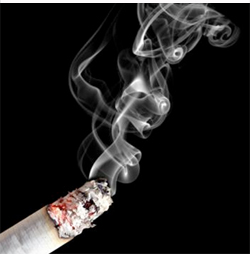Smoking Leads to Eye Damage
 If you smoke not only is your risk of developing age-related macular degeneration greater, but also the risk of existing AMD progressing faster is also higher if you are a smoker. This is according to an article published in Archives of Ophthalmology.
If you smoke not only is your risk of developing age-related macular degeneration greater, but also the risk of existing AMD progressing faster is also higher if you are a smoker. This is according to an article published in Archives of Ophthalmology.
Macular degeneration is the result of damage occuring inside the eye that can lead to irreversible blindness. It can occur in one or both eyes and cause a permanent 'blind spot' directly in the line of sight. Macular degeneration is the leading cause of blindness and predominantly affects people over the age of fifty. It has a direct adverse impact on the everyday life of people, severely limiting their ability to carry out normal tasks such as driving, reading, writing and recognising faces.
Smoking leads to oxidative or other damage to the macula, the part of the retina at the back of the eye that we use when we look directly at someone or when reading. It may also constrict blood vessels and inhibit sustainable blood flow to this area. There are two types of macular degeneration. In the first type, critical parts of the macula may die from atrophy or, in the second, more common type, critical parts of the macula are weakened, allowing abnormal new blood vessels to break through and bleed. This second type of macular degeneration leads to scarring of the macula and severe loss of the central area of vision. In the beginning, people notice distortion of straight lines and then a dark or greyish spot develops in the centre of vision, completely obscuring the vision.
Smoking causes and accelerates both types of macular degeneration and the resulting blindness can be irreversible. Macular degeneration can be stopped using laser treatment only if the condition is caught in the very early stages.
Smoking is the major preventable cause of macular degeneration, the leading cause of blindness. The chemicals in cigarette smoke (around 4000 of them) get into the bloodstream of smokers and may ignite or induce the damage to the macula, at the back of the eye. This damage results in macular degeneration and irreversible blindness over time. Laser surgery cannot reverse the damage resulting from macular degeneration unless the condition is detected at the very early stages as aforementioned. However, laser surgery may hinder or obstruct the progression of the disease and reduce the probability of blindess. Recurrence of macular degeneration occurs in about half of those who have initial successful laser treatment. For people who continue to smoke, almost all experience a recurrence of the condition. It is important to note that many people with macular degeneration do not realise that they have the condition until their second eye starts to deteriorate, as one eye has the ability to compensate for the other. Up to two thirds of people with macular degeneration in one eye will ultimately lose sight in both eyes from this condition.
The good news is when a smoker quits, the recovery process in some other parts of the body can begin almost immediately. Although it is not known whether stopping smoking reduces the risk to the second eye, it seems likely given evidence that links current smoking to development of macular condition. Providing they live long enough, one in four people will lose vision because of macular degeneration. Smoking increases this risk dramatically and may cause the loss of vision at an earlier age than it might otherwise occur.
When you inhale cigarette smoke thousands of chemicals are injected into the bloodstream and travel throughout the body. These chemicals cause damage to the macula. Tiny blood vessels can burst through the macula, leading to irreversible damage, or alternatively, the cells of the macula begin to slowly die. Both ultimately lead to loss of vision. Your risk of macular degeneration will be reduced if you quit smoking, however existing damage to the eyes cannot be repaired, particularly once vision is affected.
Your physician or optometrist may be able to perform a simple series of test to indicate if your eyes have been damaged. An ophthalmologist, or Eye M.D., will be able to determine the extent of that damage. You need to be seen urgently by an ophthalmologist if you suddenly become aware of obstructed vision in one eye or if you notice a dark or greyish patch near the centre of your vision in one eye.
For additional information or to schedule an Eye Examination with an Eye Specialist, please contact us at (866) 611-7556.
Also Serving:
Sealy, TX - Bellville, TX - Columbus, TX - Katy, TX |
